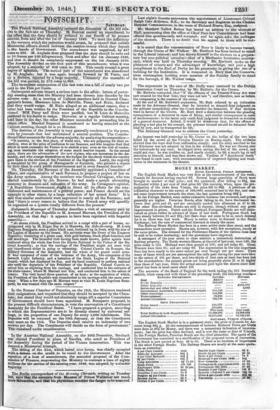POSTSCRIPT.
SATURDAY.
The French National Assembly resumed the discussion of the bill rela- tive to the Salt-tax on Thursday. M. Bourzat moved an amendment, to the effect that the duty should be reduced to one fourth of its present amount, from and after the 1st of January 1849. To meet the deficiency in the revenue which the reduction would create, he proposed that certain Ministerial officers should increase the caution-money which they deposit in the hands of Government. The amendment was negatived, by 417 votes to 336. M. Anglade then proposed that the duty should be redu ced to 10 francs per 100 kilogrammes, from and after the 1st January 1849, and that it should be completely suppressed on the 1st January 1850. The Assembly divided on the first part of this amendment; when it was adopted, by a majority of 403 votes to 360. This result created a great degree of agitation. The second part of the amendment was abandoned by M. Anglade; but it was again brought forward by M. Vezin, and on a division, rejected by a large majority. Ultimately the ensemble of the bill was carried, by 372 votes to 363.
The immediate consequence of this last vote was a fall of nearly two per cent in the Five per Cents.
Subsequent advices impart a serious turn to the affair: letters of yester- day evening state that the Ministry had been thrown into disorder by the adverse vote. At a meeting of Cabinet members held in General Chan- garnier's house, Messieurs Leon de Malville, Passy, and Bixio, declared that they would resign. M. Bixio alleged as an additional reason, that a letter had been written by the President of the Republic to the Constate- tionnel. MM. Passy and Bixio were pacified, but M. Leon de Maleville persisted in his desire to resign. However, at a regular Cabinet meeting, held later in the day, the other Ministers succeeded in persuading him to retain office. Marshal Bugeaud is mentioned as having attended at the Cabinet meeting, though he is no Minister.
The decision of the Assembly is very generally condemned in the press, even by journals that had maintained a neutral position. The Constitu- tionnel thus accounts for the adverse majority, by analyzing its composition— "It consists, in the first place, of timid men, who are preparing for their re- election, even at the price of confusion to our finances, and who imagine that that which is most necessary for France is to abolish a tax, even at the risk of render- ing soon inevitable the adoption of some much heavier impost. In the second place, there are the adversaries of the new regime, who are numerous in the As- sembly, and who avenge themselves on the budget for the cheek which the country gave them in the election of the President of the Republic. Lastly, the majority is completed by the group of Montagnards or Socialists, who perceive a chance for their ideas in every public embarrassment and in every financial disorder." On Thursday, the Bureaux of the Assembly appointed a Committee of fifteen, one representative of each Bureaux, to prepare a project of law on the Army system. Among the members was General Cavaignac, who was elected unanimously by this Bureau: he had made a speech advocating economy in finances and reduction of the army. In Cavaignac's opinion, " A Republican Government aught to direct all its efforts for the esta- blishment and maintenance of a general peace; and France should set the example to other states, by a large reduction of her armed force." It is said that similar sentiments were expressed in nearly all the Bureaux; and that "there is every reason to believe that the French army will speedily be organized on a system totally different from the present."
Ga/ignard's Messenger of Thursday describes a visit of ceremony paid by the President of the Republic to M. Armand Marrast, the President of the Assembly, on that day: it appears to have been regulated with Imperial punctilio- " At eleven o'clock, the President arrived in a coupe with a pair of horses, ac- companied only by M. Edgar Ney de la Moscowa, his Aide-de-camp. M. Louis Napoleon Bonaparte wore a plain black coat, buttoned up in front, with the star of the Legion of Honour on the breast. His servants wear the livery of the Emperor Napoleon; consisting of a green coat, with gold buttons, black plush breeches, and silk stockings. The intended visit having been made known, police agents were stationed along the whole line from the Elysee National to the Palace of the Na- tional Assembly; so that the carriage of the President might not most with any impediment either in going or returning. Colonel Cauvm du Bourget, the Military Governor of the Assembly, had the whole of the guard under arms. It was composed of some of the veterans of the Army, two companies of the Seventh Light Infantry, and a battalion of the Sixth Legion of the National Guard; which last displayed its flag, and the band continued to perform national airs until the departure of the President of the Republic. Colonel Canvin re- ceived him on alighting from his carriage, and conducted him to the entrance of the state-rooms; where M. Marrast met him, and conducted him to the saloon of honour. The visit lasted three quarters of an hour; at the expiration of which, the President of the Republic was reconducted to his carriage with the same cere- mony. When a few days ago M. Marrast went to visit M. Louis Napoleon Bona- parte, he was treated with the same respect."


























 Previous page
Previous page